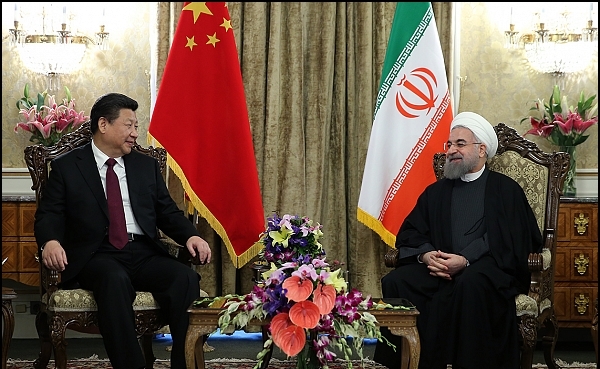 Iranian President Hassan Rouhani announced that he has conferred on ways to reinvigorate campaign against terrorist and extremist groups in the region in the meeting with his visiting Chinese counterpart Xi Jinping in Tehran on Saturday.
Iranian President Hassan Rouhani announced that he has conferred on ways to reinvigorate campaign against terrorist and extremist groups in the region in the meeting with his visiting Chinese counterpart Xi Jinping in Tehran on Saturday.
“Campaign against terrorism, extremism, violence and fighting against differences that have entangled the region were among issues discussed between the two sides,” President Rouhani said at a joint press conference with Xi in Tehran today.
Establishment of security and stability in the Middle-East region, consultations and assistance to those countries which are fighting against terrorism, including Afghanistan, Iraq, Syria and Yemen, unilateralism, the future of the region and the world as well as threats that need attention in the mid- and long-run and the important goals sought by Tehran and Beijing in the region were also among the reviewed areas, according to Rouhani.
Elsewhere, he referred to the endorsement of different documents between the two countries and the necessity for enhancement of bilateral relations, and said, “Today, we negotiated the two countries’ strategic relations, compilation of a comprehensive 25-year-long plan and enhancement of the level of the two countries’ ties up to $600bln in the next 10 years.”
The Iranian president said that he and President Xi also discussed the monetary, banking and investment issues as well as long-term contracts on energy, railways, ports and technology parks construction and expansion of cooperation in industrial, mining and tourism sectors.
“In addition to economic issues, we also discussed and exchanged views in areas of science, new technologies, culture, tourism, security and defense,” he added.
“I consider the Chinese president’s important visit to the Islamic Republic of Iran along with a high-ranking delegation as an important historical event and I rest assured that a new chapter of cooperation has opened between Iran and China from now on,” Rouhani underlined.
In relevant remarks in November, Iranian First Vice President Eshaq Jahangiri in a meeting with Head of the Central Politburo of the Chinese Communist Party Meng Jianzhu in Tehran underlined the need for Tehran-Beijing cooperation to confront extremism and terrorism in the region. “The worst form of violence is underway in Iraq and Syria today and Iran is ready to cooperate with China in resolving the regional problems,” Jahangiri said during the meeting.
Also on Tuesday evening, President Rouhani in a meeting with Pakistani Prime Minister Nawaz Sharif vowed to assist any world state which seeks Iran’s help in campaign against terrorism.
During the meeting in Tehran, Rouhani expressed concern about exacerbation of insecurity by terrorism in the region, and said that policy of his government is based on constructive interaction with other countries, specially neighbors. Iran will reply positively to the requests of those countries which are fighting against terrorism, he added.
Rouhani described sowing discord and disputes among Muslims as an unacceptable issue, and said Iran favors strengthening unity and solidarity among all Muslims, whether Shiite or Sunni, and is ready to cooperate with countries of the region in the fight against terrorism, extremism and sectarianism.
Chinese President Xi Jinping said he hopes for a “new chapter” in relations with Iran after the lifting of international sanctions under a historic nuclear deal, as he paid the first visit by a Chinese leader to the Islamic Republic in 14 years.
“In cooperation with the Iranian side and by benefiting from the current favorable conditions, China is ready to upgrade the level of bilateral relations and cooperation so that a new chapter will start in bilateral relations,” Xi said after meeting with Iranian President Hassan Rouhani, according to Iranian state TV.
Trade between the two countries stood at some $52 billion in 2014, but that figure dropped last year due to plunging oil prices. China is Iran’s biggest trade partner, and continued purchasing oil from Iran after nuclear-related sanctions were tightened in 2012, despite U.S. pressure.
